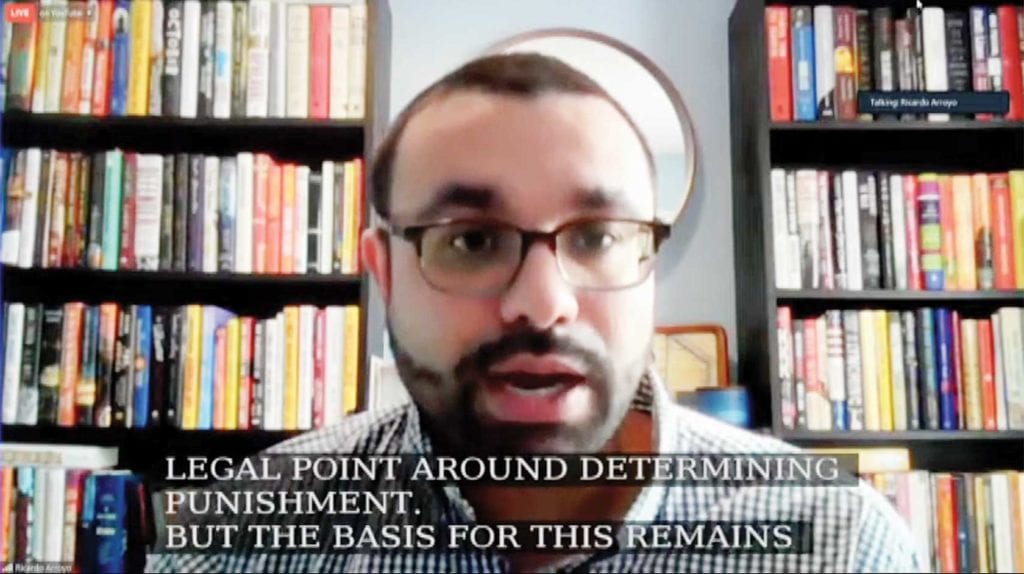Councilors refile tear gas regulation ordinance
Measure would limit officers’ use of crowd control weapons

Last summer’s legislative agenda yielded an expansive police reform bill at the state level and a slight reduction in police funding in the city of Boston. Since then, moves to reduce police violence have hit a roadblock. City Councilors Andrea Campbell and Ricardo Arroyo refiled an ordinance limiting the use of crowd control weapons, after police did not support it and Mayor Martin Walsh did not sign it.
During a City Council meeting on Wednesday, Feb. 24, Arroyo announced that the refiled ordinance had a slight change, but the councilors were after the same goal: preventing further violence in crowds as police attempt to stop crime.
“I know when this was up last year, there was a call for a complete, total ban. And this is not that,” Arroyo said during the meeting. “What this does is create a framework to ensure that we’re doing this in a way that is as safe as it can be.”
In a working session for the original ordinance, headed by Committee on Government Operations Chair Lydia Edwards, Boston Police Department Sgt. Kevin McGoldrick objected to limits on crowd control tactics due to concerns that such limits leave no room for officers’ judgement and discretion. Representing his colleagues at the BPD, he rejected the ordinance completely.
The ordinance stipulates that in order for the BPD to use any tear gas, rubber bullets or similar tactics to disperse a crowd of more than 10 people, they must give two separate warnings and wait two minutes. The only change to the ordinance is a minor revision on how punishment is determined for noncompliance with the ordinance.
The chemical irritants police sometimes use “can cause permanent injuries, including blindness, glaucoma, or death from chemical burns to the throat and lungs or from respiratory failure,” the ordinance reads. The dangers of these tactics are recorded by the U.S. Centers for Disease Control and Prevention.
The original ordinance passed 8-6, with some councilors expressing worry that sending an ordinance to the mayor’s desk that directly involved police, without police support, could present problems.
Negotiating with police
State Rep. Russell Holmes, who worked on the Massachusetts police reform bill signed into law on Dec. 31, said that working with police on legislation is difficult at every level. As part of the Massachusetts Black and Latino Legislative Caucus, Holmes said the group’s regular meetings with officers were helpful in getting legislation passed.
“I think we made a great stride in having conversations that were hard conversations that we normally don’t have. And that’s what they need to do at the city level as well,” Holmes told the Banner.
In negotiating with unions, the officers are told they are heroes, he said, offering them a level of privilege.
“They do still need to have some accountability. They still do need some oversight,” he said.
Holmes added that without regular conversations about oversight, police can react to legislative accountability with surprise.
Though Arroyo’s ordinance doesn’t institute a ban on all crowd control tactics, Edwards said police may still view it that way.
“It is literally just a warning system put in, and protocol for the use of kinetic weapons. This is not a ban, and I just wanted to remind people of that,” she said during the recent council meeting. “It seems so unnecessarily controversial, in as much as we’re asking our police officers to enshrine their protocol, and to allow people to have a warning.”
Each councilor who spoke focused on the adverse effects of the weapons rather than the politics surrounding police reform.
During the council’s meeting, Campbell thanked constituents who called and emailed about their personal experience with crowd control weapons.
“It really, at moments, was quite painful to listen to some of these stories, so I want to appreciate the residents who came forward,” she said.






